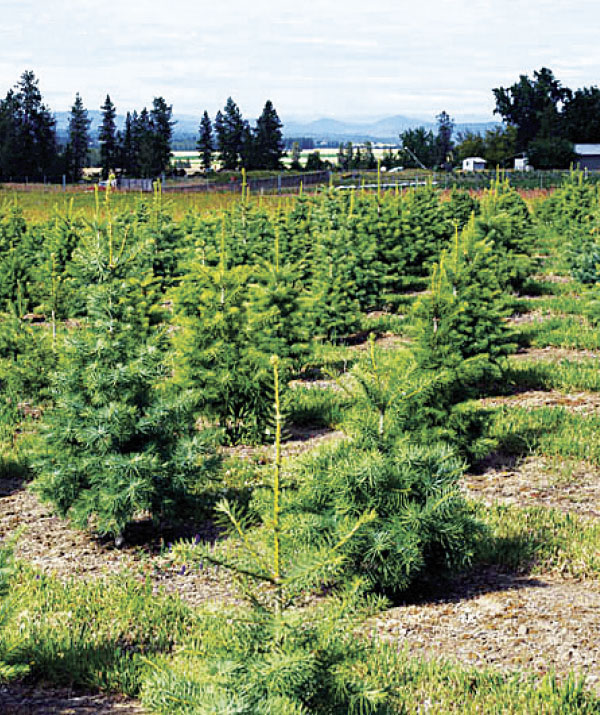Agritourism gives family business a fresh lease on life, and a little fun to boot.
Rainclouds sweep across the prairie as we pull up the driveway to Fresh Cut Farms just north of Spokane. Calling a greeting, owners Jim and Connie Long open the gate and welcome us for an early July tour of their market gardens.
“We’re a work in progress—new to the agritourism business,” says Jim. “We stood up the farm in 2016 as something to do when I retired from the Air Force. So far, it’s been a lot of trial and error.”
He unlatches a seven-strand hot wire fence, meant to keep the deer and coyotes out, and ushers us into the garden. The weed-free area is lush and overflowing with early squash, greens, tomatoes, potatoes, corn, cabbage, peppers, and more.
“We’ve learned a lot,” says Connie. “We sell out at every market, so now our challenge is to grow more food.”
Fresh Cut Farms is one of thirteen charter members in the Wild Rose Prairie Community Association, an agritourism venture mentored by Trevor Lane, Washington State University Ferry County Extension director. Good-natured and easy-going, Lane joins us while we’re admiring the Longs’ strawberry patch.
As we walk, it becomes obvious—from the land-clearing pigs to curious sheep and orchard—that the couple’s new project is highly labor intensive. At the top of the list is restoring the original homestead—an 1890s clapboard house complete with gables and gingerbread trim that is listed with the Spokane Historical Society.
“Our plans are to turn it into a historic bed and breakfast that offers a day-in-the-life-of-a-farm experience with specific events like a shearing day or lambing season,” Jim explains to Lane. “We also want to put a roof on the old log barn and make a venue out of it.”
“The million-dollar question is what do we focus on first here?” says Connie. “The animals? The fence? The garden? The old house?” Lane, whose specialty is community economic development, promises to sit down and go over it all with them soon.
They’re in good hands. Lane, as a board member of the Washington Festivals and Events Association, helps troubleshoot problems for small-town festivals as well as large events like the Skagit Valley Tulip festival, Washington, D.C.’s National Cherry Blossom Festival, and the Seattle Chocolate Festival. He honed his skills as owner-operator of the Backwoods Music and Camping Festival in Oklahoma, which became one of the largest in the region. Lane sold the business when he made the move to rural northeastern Washington in 2014.
“The economic landscape in Republic has declined significantly during the time I’ve been here,” says Lane. “First, the lumber mill shut down. Then, they pulled out the railway and locals had no way to transport goods. On top of that, the gold mine closed. County budgets are strained—commissioners are wringing their hands trying to maintain the services we have left.”
As the newly appointed Extension director, Lane knew he had to work quickly. Capitalizing on the area’s nostalgia and pristine beauty, he brainstormed with community leaders, including Jenny Konz, owner of The Goat Farm-Goat Patrol. Together, they created a farms and recreation map aimed at promoting agritourism in Ferry County. The map highlights 20 small farms and 20 other sites offering rural education or entertainment.
“That was our first success,” Lane says. “That’s when I showed proof of concept—that you can bring farmers together to organize and collaborate. We are now in the early phases of working with the Colville Confederated Tribes to expand the map.”
Ferry County is hardly unique in its struggles. Lane says most of northeast Washington is economically distressed, and word on the street is that agritourism is where you get your money.
So much so, in fact, that Lane’s agritourism workshops are now in demand all over the state. It was at a 2018 training hosted by Pat Munts, Spokane County Extension horticulture and agriculture coordinator, that Lane met Jim and Connie Long. They took the information back to their fledgling 501c3 nonprofit group and shared it with Ari Alvarez, Lori Robirts, and a few others.
“The Wild Rose Prairie Community Association did everything we did in Ferry County but made it more formal,” Lane says. “They’re now writing grants and doing other fundraising as well as research on how to better serve customer needs and desires.”
This year, the organization kicked off the growing season by hosting their second annual Wild Rose Prairie Days which included country-grown fun at Fresh Cut Farms, Mud Creek Farm, Evening Light Lavender, North Spokane Farm Museum, and more.
“Everybody I’ve talked to has said this has been a big financial shot in the arm,” says Lane. “Every month gets a little better and they see more traffic and visitors. It’s a quick way to infuse a little cash and help the farmer with gas and other bills.”
Web extra
Gallery: Photos from Wild Rose Prairie by Crystal Toreson









